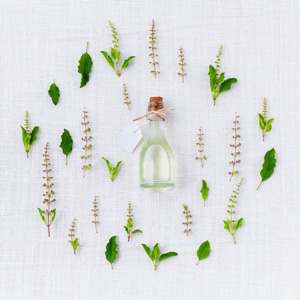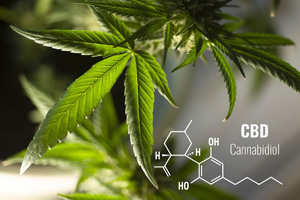Top 5 Herbs To Help You Ease Panic Attacks |
Anxiety sufferers may investigate natural therapies as an alternative to prescription medications. This could be because some drugs, such as beta-blockers and benzodiazepines, can have unpleasant side effects. Every year, about 18 percent of adults in the United States suffer from anxiety problems. Anxiety disorder therapy options have expanded throughout time to include both prescription drugs and natural remedies. Several herbal supplements, according to research, may be beneficial for diseases like anxiety, depression, and more.
Before reducing or quitting prescription medicine or starting a herbal supplement, consult your doctor. Some herbs can have adverse side effects or interact with other drugs. We've put up a list of 5 herbs and supplements that may aid with anxiety. 1. Ashwagandha Adaptogens, such as Ashwagandha or Withania somnifera, are a type of plant. Adaptogens work by influencing the body's stress-response mechanisms and hormones. Ashwagandha has a history of usage in Ayurvedic medicine or traditional Indian medicine. We explored the efficacy of ashwagandha for stress and anxiety in a small clinical experiment conducted in 2019. A total of 58 people with a high level of stress took part in the eight-week trial. Each person was randomized to one of three treatments at random: ashwagandha extract at doses of 250 mg or 600 mg per day. The stress hormone cortisol was shown to be lower in the ashwagandha group than in the placebo group. They also noticed an improvement in the quality of their sleep. Ashwagandha is used as a tablet or a tincture. It dramatically lowered stress levels in participants who received 600 mg of ashwagandha. Participants who took the smaller amount of ashwagandha, on the other hand, did not see a stress reduction. In a separate 2019 trial, 60 people with mild anxiety were given either 250 mg ashwagandha or a placebo for 60 days. It significantly reduced some indicators of stress in those who took the herb but not others. 2. Chamomile Chamomile is a flowering herb with a daisy-like appearance. Roman chamomile and German chamomile are two varieties of chamomile that can be used medicinally. Some people use chamomile tea, pills, extracts, and other herb forms to ease stress and anxiety. A 2016 clinical study investigated the safety and effectiveness of chamomile as a long-term treatment for generalized anxiety disorder (GAD). For 12 weeks, all 93 individuals were given 1,500 mg of chamomile daily. After that, some people continued to take chamomile for the next 26 weeks, while others switched to a placebo. Researchers discovered that those who remained to use chamomile were no more likely than those who switched to placebo to experience a return of GAD symptoms. When relapse did occur, however, the symptoms were milder. Certain medicines, such as the blood thinner warfarin and the anti rejection drug cyclosporine, may interact with chamomile. Before using chamomile teas or supplements, anyone taking any form of medication should consult their doctor. 3. Valerian Valerian, or Valeriana officinalis, is a European and Asian plant. For decades, people have used the root to treat sleep difficulties, anxiety, and sadness. Valerian root can be consumed as a tea, pill, or tincture. Only a few high-quality research on valerian's effects is still to be published. There is insufficient evidence to evaluate if valerian can treat anxiety or depression, according to the National Center for Complementary and Integrative Health. According to studies, valerian is typically safe. However, according to the NCCIH, there is no data on the long-term use or safety of valerian in the following groups:
4. Kava kava Kava kava, or just kava, is a shrub endemic to the Pacific Ocean's islands. Piper methysticum is its scientific name. Kava is a ceremonial beverage used in the Pacific Islands to reduce stress and change the mood. In 2013, a placebo-controlled study looked into the efficacy of kava as a therapy for GAD. Seventy-five people took part in the 6-week trial. Each individual was given three treatments: Kava extracts in 120 mg or 240 mg or a placebo daily. Compared to people who got a placebo, those who took kava saw a considerable reduction in anxiety, suggesting that kava could be a somewhat effective short-term treatment for GAD. Kava was also shown to be safe in the study. The Food and Drug Administration (FDA) warned in 2002 that consuming kava supplements could cause severe liver damage. The World Health Organization has stated that the link between kava and liver toxicity is uncertain and that scientists should re-evaluate the findings. Kava is a medication that can be purchased online or in health food stores. 5. Cannabidiol Cannabidiol is one of the active ingredients in cannabis (CBD). CBD is believed to have a soothing impact on the nervous system, according to research published in 2019. Even though the FDA has not supported CBD for use, this natural substance is readily available in CBD gummies, candies, CBD cream, CBD oil, and other products. The study above looked at whether CBD could aid in the treatment of anxiety and sleep issues. They analyzed the data retrospectively from 103 adults taking CBD as a supplementary therapy for anxiety and sleep difficulties. Within the first month of consuming CBD, 57 of the 72 adults in the final group reported an anxiety reduction. These scores remained low for the 3-month trial period. The researchers concluded that CBD could help those suffering from anxiety problems. Clinical trials, on the other hand, are required to confirm these findings. Bottom Line Herbs have been used for thousands of years to treat a range of diseases. In scientific studies, certain herbs have been demonstrated to help with anxiety symptoms. Some herbal products, like prescription medications, might have adverse side effects. It's also possible that herbal products will take a bit longer to work. People must evaluate these factors while weighing the benefits and downsides of a specific treatment. Certain herbs and medications can have dangerous interactions. Before beginning to use herbal goods, anyone taking any form of medicine should visit their doctor. |
Thank you for visiting our page "Top 5 Herbs To Help You Ease Panic Attacks" |



 FEATURE ARTICLES
FEATURE ARTICLES


